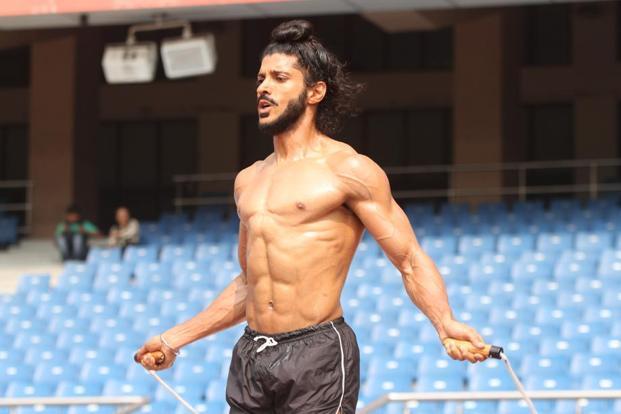80 races. 77 won. That’s Milkha Singh’s supremely glorious track record for you. Bhaag Milkha Bhaag is how director Rakeysh Omprakash Mehra and Prasoon Joshi appraise super-sprinter Milkha Singh’s life, and they’ve gone totally butter-fingers while taking creative liberties to give this biographical account a more commercial touch. And how! The drama-quotient of the film has been so substantially raised that it really becomes difficult to filter out real from fiction.
The over three hour long Milkha Singh’s biopic is narrated by Gurudevji (Pavan Malhotra) who’s the sprinter’s first coach. The narration begins with an Olympic race, which concludes only to lay foundation for the rest of the film. What follows is a chronicle of the athlete’s life from his childhood where he lost almost his entire family during the brutal India-Pakistan partition, to how he rose to a celebrated iconic standing from the clutches of penury. ‘Bhaag‘ has been used as a beautiful metaphor throughout the movie, as the protagonists runs away from all the comforts, convenience and the lows in his life to stand heads-high in the society.

Now the best thing about this film- Farhan Akhtar. This man translates on-screen a lovable Milkha, and has spent himself in every respect trying to replicate the athlete, not only in looks, but also in his perfect Punjabi accentuations. The way he’s evolved as a performer, punctuating the minutest of the expressions exemplarily, is truly commendable. He does not act the part, he lives the part, and the parts where the ‘Flying Sikh’ suffers moments of withdrawal have been appealingly interpreted on the 70mm. He truly deserved all the claps and whistles that were being showered on him. Next in the honour rank follows Divya Dutta, who plays Milkha’s elder sister in the film with tremendous authority. Other leading ladies- Sonam Kapoor, Rebecca Breeds and Meesha Shafi don’t have much of a screen presence. Prakash Raj and Pawan Malhotra perform amazingly well. Dalip Tahil puts on a conventional Nehru.

Mehra’s cinematic lovemaking with the camera is an already known fact, with Rang De Basanti, Aks and Delhi 6 all scoring high on technically sound and creative visuals. But Bhaag Milkha Bhaag makes us question that very storytelling genius. This film relies very highly on post-production with a heavy dosage of slow-mo, though the ad-like treatment to some visuals are quite catchy. The slow motions add to extended minutes (which could’ve been avoided), but overall the direction is ok. Shankar-Ehsaan-Loy’s racy music pumps up the mood in parts, while at other times it feels as if the songs were forcefully added. And so were some of the comic scenes. With Paan Singh Tomar having set such a high standard, witnessing the same Bollywood cliches again was bit of a mood-puncture. This film wins hands down on cinematography, and Binod Pradhan deserves a huge applause for his indulgence in sepia. The editing could’ve been more tight. The set designs aesthetically salute the era of the 50s.
All things inclusive, this film sprints a little longer after having made its point, but let’s put the blame on inertia shall we, for it is just an insignificant disappointment. For all the positives the film packs in, I milk it a bronze.
3/5
80 races. 77 won. That’s Milkha Singh’s supremely glorious track record for you. Bhaag Milkha Bhaag is how director Rakeysh Omprakash Mehra and Prasoon Joshi appraise super-sprinter Milkha Singh’s life, and they’ve gone totally butter-fingers while taking creative liberties to give this biographical account a more commercial touch. And how! The drama-quotient of the film has been so substantially raised that it really becomes difficult to filter out real from fiction.
The over three hour long Milkha Singh’s biopic is narrated by Gurudevji (Pavan Malhotra) who’s the sprinter’s first coach. The narration begins with an Olympic race, which concludes only to lay foundation for the rest of the film. What follows is a chronicle of the athlete’s life from his childhood where he lost almost his entire family during the brutal India-Pakistan partition, to how he rose to a celebrated iconic standing from the clutches of penury. ‘Bhaag‘ has been used as a beautiful metaphor throughout the movie, as the protagonists runs away from all the comforts, convenience and the lows in his life to stand heads-high in the society.
Now the best thing about this film- Farhan Akhtar. This man translates on-screen a lovable Milkha, and has spent himself in every respect trying to replicate the athlete, not only in looks, but also in his perfect Punjabi accentuations. The way he’s evolved as a performer, punctuating the minutest of the expressions exemplarily, is truly commendable. He does not act the part, he lives the part, and the parts where the ‘Flying Sikh’ suffers moments of withdrawal have been appealingly interpreted on the 70mm. He truly deserved all the claps and whistles that were being showered on him. Next in the honour rank follows Divya Dutta, who plays Milkha’s elder sister in the film with tremendous authority. Other leading ladies- Sonam Kapoor, Rebecca Breeds and Meesha Shafi don’t have much of a screen presence. Prakash Raj and Pawan Malhotra perform amazingly well. Dalip Tahil puts on a conventional Nehru.
Mehra’s cinematic lovemaking with the camera is an already known fact, with Rang De Basanti, Aks and Delhi 6 all scoring high on technically sound and creative visuals. But Bhaag Milkha Bhaag makes us question that very storytelling genius. This film relies very highly on post-production with a heavy dosage of slow-mo, though the ad-like treatment to some visuals are quite catchy. The slow motions add to extended minutes (which could’ve been avoided), but overall the direction is ok. Shankar-Ehsaan-Loy’s racy music pumps up the mood in parts, while at other times it feels as if the songs were forcefully added. And so were some of the comic scenes. With Paan Singh Tomar having set such a high standard, witnessing the same Bollywood cliches again was bit of a mood-puncture. This film wins hands down on cinematography, and Binod Pradhan deserves a huge applause for his indulgence in sepia. The editing could’ve been more tight. The set designs aesthetically salute the era of the 50s.
All things inclusive, this film sprints a little longer after having made its point, but let’s put the blame on inertia shall we, for it is just an insignificant disappointment. For all the positives the film packs in, I milk it a bronze.
3/5